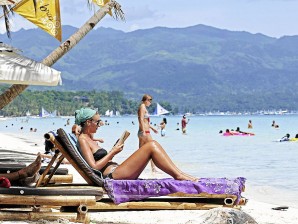Not just yet. They can’t expand and pave paradise even with good intentions.
The Supreme Court has ordered a temporary halt to the 40-hectare reclamation project on the resort island of Boracay, a P1-billion undertaking designed to help the world famous site cope with growing tourist arrivals but seen as a threat by local businessmen and environmental scientists.
If completed as planned, the project would redraw the map of the key-shaped Boracay and also that of neighboring Barangay Caticlan in Malay town on mainland Aklan province, which serves as a takeoff point to the white-sand island.
At 40 ha, the project would also reclaim from the sea a combined area nearly twice the size of the University of Santo Tomas campus in Manila.
In an en banc session on Tuesday, the high court granted the petition for a temporary environment protection order (Tepo) filed on June 1 by members of the Boracay Foundation Inc. (BFI), a group of business owners operating on the island.
A Tepo is the equivalent of a temporary restraining order in criminal cases.
“We are very grateful that the Supreme Court recognized the merits of our petition,” BFI president Loubelle Cann said when reached for comment.
“We are looking forward to the high court ultimately favoring our call for environmental preservation and protection when they issue their final decision,” Cann told the Inquirer by phone.
Comprehensive study
“This will pave the way for a comprehensive study of the project and its impact on the environment,” she added.
The Supreme Court administrator and spokesperson, Midas Marquez, said the 15-member tribunal considered the arguments presented by the BFI in its petition.
The Tepo is to take effect immediately and would remain so until the high court decides to lift it, Marguez said in a briefing.
“This means that the respondents are being ordered to cease and desist from conducting reclamation activities along the coastlines of Caticlan,” Marquez said.
The court also directed the respondents to file their comments to the BFI petition within 10 days.
Aside from the Aklan provincial government, the other respondents in the BFI’s petition for mandamus were the Philippine Reclamation Authority and Environment Management Bureau (EMB).
Fragile reefs
Marquez said officials of the government agencies concerned may be cited in contempt of court should they fail to comply with the order.
In asking the justices to stop the project, BFI claimed that the reclamation activities on the shores of Boracay would only threaten the already fragile coral reefs in the area.
The BFI also asked the high court to revoke the reclamation permit issued by the EMB to the provincial government.
Joel Butuyan, a legal counsel for the BFI, said the reclamation project near Caticlan’s jetty port, for example, would adversely affect the natural flow of seawater around Boracay.
“Reclaiming that part of the island would only change the contours of the area, and discolor Boracay’s white sand beaches,” he said.
Like killing the goose
“This project is like killing the goose that lays the golden eggs,” Butuyan earlier warned.
Aklan Gov. Carlito Marquez said his office had yet to receive either an official copy of the BFI petition and of the Supreme Court order.
“We will abide by the court order even as we have asked our lawyers to submit our reply to the petition as soon as we have received the official copy,” he told the Inquirer.
The official said he believed the petition against the project would provide an opportunity to resolve the legality of the project.
A day before the Supreme Court ruling, he issued a statement dismissing the BFI petition as baseless, saying the issues it raised before the tribunal had already been addressed by concerned government agencies.
On Monday, the governor said the environmental concerns cited by the group had been subjected to studies and the scrutiny of the Department of Environment and Natural Resources, as shown by the environmental compliance certificate that the DENR had granted to the project.
No direct impact
“We are not killing the goose, why should we?” Governor Marquez said in apparent response to Butuyan’s comment. “Instead, we are creating another goose that will provide huge employment opportunities for residents which will help alleviate poverty.”
The governor was reacting to claims made by BFI that the reclamation project would pose a threat to Boracay’s environment and its P13-billion tourism industry.
He argued that the project would not have a direct impact on Boracay Island since the reclamation and actual development work would be limited only to 2.64 ha in Caticlan.
“We will not allow the destruction of the environment. We love Boracay and care for our tourists as we do care for Aklan,” the governor said.
